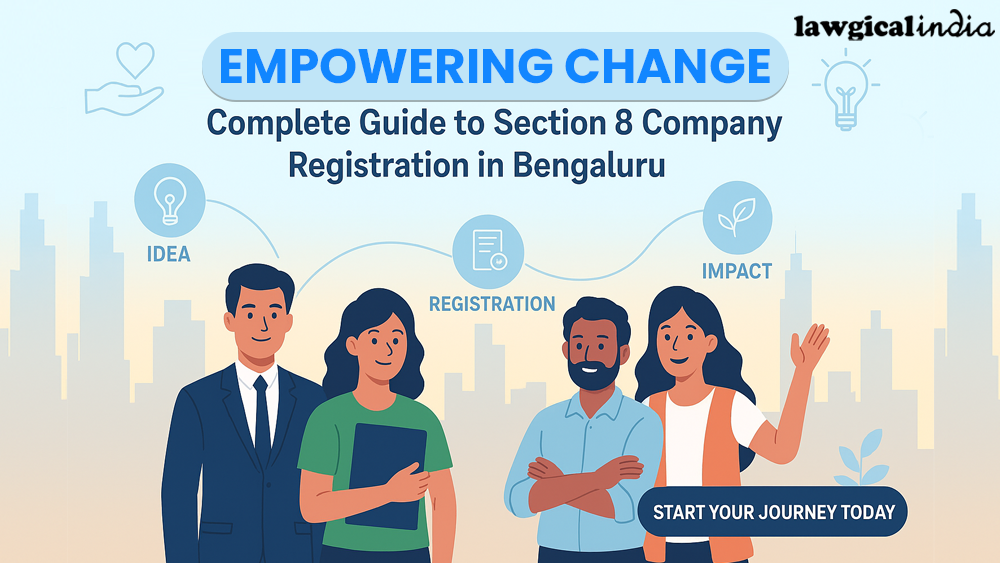An exciting journey of starting a business in India is about to begin, especially if private limited company registration is preferred. With a structured legal framework and limited liability benefits, it is one of the most preferred types of business structures by startups, entrepreneurs, and companies in the growth phase. But how does the process of Pvt Ltd registration actually go? What are the main steps, documents involved, advantages, and compliance?
This exhaustive guide by Lawgical India answers all your questions regarding private Ltd company registration in India and also provides a step-by-step roadmap.
What is a private limited company.
A Private Limited Company (Pvt Ltd) is a corporate structure governed under the Companies Act, 2013. It is a separate legal entity from its shareholders and provides limited liability protection to them. There must be at least two directors and two shareholders to set this up. This is suitable for businesses aiming to raise funds externally and grow over time.

Some Key Characteristics of a Pvt Ltd Company Registration
● Limited Liability: The liability of the shareholders is limited to the amount they have invested in the company.
● Separate Legal Entity: The company is distinct from its members/owners.
● Perpetual Succession: Continuance of the company irrespective of transfer of ownership or death of directors.
● Ease of Fundraising: Private Ltd company registration in India allows companies to raise funds by equity, venture capital, and private placements.
● Transferability of Shares: Shares are easily transferable with the consent of members.
Documents Required for Private Limited Company Registration
A comprehensive checklist of documents for Pvt Ltd company registrations:
For Directors and Shareholders:
● PAN Card—mandatory for Indian national
● Aadhaar Card/Passport/Voter ID
● Address proof (Bank statement/Utility bill max. 2 months old)
● Passport-size Photograph
● DIN (Director Identification Number)
● DSC (Digital Signature Certificate)
For Registered Office:
● Utility bill (Electricity, water, or gas bill
● NOC (No Objection Certificate) from the property owner
● Rent Agreement (if applicable)
Here is a complete step-by-step procedure for a private ltd company registration in India:
1. Get the Digital Signature Certificate (DSC):
A DSC will be required for all the directors and shareholders to digitally sign the forms of the processes.
2. Apply for the Director Identification Number (DIN):
A DIN has to be possessed by each company director on an individual basis.
3. Reserve Unique Name through RUN (Reserve Unique Name):
Next, one has to choose a unique name for his/her company. The name should not be identical to any other existing name of a company or trademark; one should file for their name with the MCA (Ministry of Corporate Affairs) through the RUN form, which stands for Reserve Unique Name.
4. Drafting of MOA & AOA:
The Memorandum of Association (MOA) describes the business objective.
The Articles of Association (AOA) stipulate the internal rules and governance.
5. Filing SPICe+ Form (INC-32)
The incorporation, PAN, TAN, GST, EPFO, and ESIC registrations are all consolidated in one form.
6. Certificate of Incorporation:
The approval is followed by the ROC issuing the Certificate of Incorporation.
Advantages of Private Limited Registration:
1. Brand Credibility:
The Pvt Ltd suffix stands for its brand trust among the customers, vendors, and investors.
2. Investors' Preference:
Investors prefer private limited companies because they have apparent structure and compliance.
3. Limited Risk Exposure:
Shareholders are not compulsorily liable for the company's debts.
4. Tax Planning:
A private limited company has more options to save taxes.
5. Employee Attractiveness:
Issuing ESOPs to attract the best talents becomes easier.
Compliance Guidelines on Various Aspects After Registration
After registration of the Pvt Ltd Company, it must comply with the following:
1. Appointment of Auditor
The statutory auditor must be appointed within 30 days from the date of incorporation.
2. Commencement of Business
File Form INC-20A for declaration of commencement of business within 180 days.
3. Annual Filings
Annual filing of Form AOC-4 and MGT-7.
4. Income Tax Filings
The annual ITR has to be filed with the Income Tax Department.
5. Board Meetings
There shall be a minimum of four board meetings held in a year.
Non-compliance would attract penalties and disqualification of directors. Lawgical India ensures that you remain 100% compliant even after registration.
Why Lawgical India for Pvt Ltd Company Registration?
At Lawgical India, we smoothen the complete private limited company registration for you. Our services broadly include:
● Expert consultation
● Name reservation assistance
● Application for DSC & DIN
● Drafting of MOA & AOA
● SPICe+ forms filing
● Management of post-registration compliances
Our fast turnaround time, legal precision, and affordable pricing ensure that you can concentrate on business expansion while we look after the legal aspects.
Most Common Mistakes to Avoid in Private Limited Company Registration
● Choosing a name without proper search or trademark check
● Errors in MOA/AOA or documentation
● Missing deadlines for post-registration compliance
● Not taking assistance from any legal expert
Avoid these issues by collaborating with trusted professionals such as Lawgical India.
FAQs on Private Limited Company Registration
1. What is the minimum capital required for Pvt Ltd company registration?
There is no minimum capital requirement. You can start with any amount you deem fit.
2. How long does the private limited company registration process take?
Normally it takes 7 to 10 working days, depending on the speed of document verification and MCA approval.
3. Can NRIs or foreign nationals go for a private ltd company registration in India?
Yes, with prior RBI approval and compliance with FDI norms, foreign nationals and NRIs can be directors or shareholders.
4. Is it mandatory to have a commercial address for company registration?
No, you can register the company at your residential address, provided you have valid proof and NOC.
5. Can I register a Pvt Ltd company alone?
No, a Pvt Ltd company registration requires a minimum of two directors and two shareholders. For single ownership, you may choose a One Person Company (OPC).











